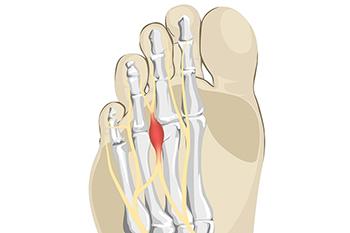
Some people feel the sensation of having a small pebble in their sock or shoe, and this can be a symptom of the foot condition known as Morton’s neuroma. It can develop as a result of wearing shoes that do have enough room in the toe area to move freely in. High heels can fall into this category and can affect women who frequently wear this type of shoe. This ailment affects the nerve between the third and fourth toes and can cause severe pain and discomfort. The nerve can become compressed and irritated, and mild relief may be felt when the shoes that are worn have a wider toe box. This condition will not improve when high heels are consistently worn, and surgery may be necessary to remove or repair the nerve. Patients may find some relief when anti-inflammatory medications are taken and the affected foot is massaged. If you have pain in this part of your foot, it is suggested that you visit a podiatrist who can diagnose and treat Moton’s neuroma.
Morton’s neuroma is a very uncomfortable condition to live with. If you think you have Morton’s neuroma, contact Gary J. Kaiserman, DPM of Achilles Footcare Center. Our doctor will attend to all of your foot care needs and answer any of your related questions.
Morton’s Neuroma
Morton's neuroma is a painful foot condition that commonly affects the areas between the second and third or third and fourth toe, although other areas of the foot are also susceptible. Morton’s neuroma is caused by an inflamed nerve in the foot that is being squeezed and aggravated by surrounding bones.
What Increases the Chances of Having Morton’s Neuroma?
- Ill-fitting high heels or shoes that add pressure to the toe or foot
- Jogging, running or any sport that involves constant impact to the foot
- Flat feet, bunions, and any other foot deformities
Morton’s neuroma is a very treatable condition. Orthotics and shoe inserts can often be used to alleviate the pain on the forefront of the feet. In more severe cases, corticosteroids can also be prescribed. In order to figure out the best treatment for your neuroma, it’s recommended to seek the care of a podiatrist who can diagnose your condition and provide different treatment options.
If you have any questions, please feel free to contact our offices located in Forest Lane and West Kiest Boulevard Dallas, TX . We offer the newest diagnostic and treatment technologies for all your foot care needs.
